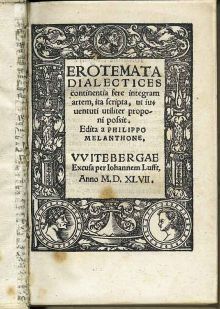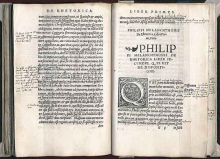 |
Melanchthon, the "Praeceptor Europae" (Teacher of Europe)
Melanchthon and England
Students from all over Europe came to Wittenberg University — more students, in fact, than any other German university during the Lutherian and Melanchthonian era. No wonder, then, that William Shakespeare had Hamlet study in Wittenberg. Not that Hamlet’s studies in Wittenberg are central to the plot of the tragedy. Rather, the most famous monologue in the history of theatre — "to be or not to be" — may have been influenced by somebody from Wittenberg, making Shakespeare’s choice of Hamlet’s university anything but arbitrary. In his textbook on logic ("Erotemata Dialectices"), Melanchthon discusses in detail the basic principle of logic: that something that is, cannot fail to be at the same time. To be or not to be: that is the question on both minds, Hamlet’s and Melanchthon’s. Or rather, that is the question that, without Melanchthon, Hamlet might never have asked.
Shakespeare also had access to English translations of Melanchthon’s teachings. In the 16th century, several English scholars translated more than 20 of Melanchthon’s works into a more vulgar tongue, namely English. Lectures on Melanchthon’s teachings are known to have been given at the Universities of Cambridge, Eton and Oxford. "Praeceptor Angliae" is one of the many titles by which Melanchthon became known. King Henry VIII himself attempted to bring Melanchthon to England. Years later, in 1553, the University of Cambridge decided to offer Melanchthon a position as a professor. Indeed, the British Library even contains royal documents instructing the recipient to pay 100 pounds to defray Melanchthon’s travel expenses. Melanchthon, however, had always declined such flattering offers from Germany and abroad and remained loyal to the University of Wittenberg.

Erotemata Dialectices, 1547

Philipp Melanchthon, De Rethorica
1524 edition. It was translated into English in 1532.
|
|

